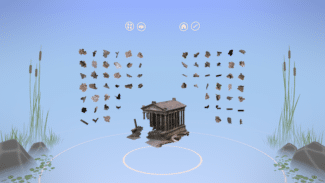Puzzling Places features some stunning photogrammetric 3D puzzles on Oculus Quest, but does it bring all the right pieces to the table? Here’s our full Puzzling Places review.
It’s been a long journey to the Oculus Store for Puzzling Places. What started out as a prototype of a 98-piece 3D model on SideQuest in April 2020 evolved into something a bit more substantial a year later, when it debuted 6 more puzzles in beta as one of the first 12 apps available as part of Facebook’s App Lab distribution system. Powered along the entire way by a loyal Patreon following, Puzzling Places has now found its way to a full release on the Oculus Store for Quest.
The premise is simple — put together puzzle pieces to form a 3D model. It’s just like a standard jigsaw puzzle, but with more literal and figurative depth. The hook is that each of the puzzles’ 3D models are highly-detailed photogrammetry captures of real life locations or objects. You’re essentially recreating a model built from 3D scans, now split into a number of pieces for you to put back together.
The 16 included puzzles range from large landscapes to individual buildings or even singular objects, providing very different senses of scale. For each, you have the option to choose between 25, 50, 100, 200 or 400 puzzle pieces. Once complete, the models are absolutely stunning and you’ll likely spend a few minutes just admiring the finished product from different angles. There’s a really high level of detail on offer and while there are a few literal rough edges, on the whole the quality of the scans are very impressive.

The Virtual Jigsaw Experience
For each puzzle you’re given a few reference images to help, akin to the photo on a puzzle box. While in-progress, individual puzzle pieces will sometimes look confusing and almost foreign when compared to the references. However, once you get rolling, things slip into place and seemingly unconnected pieces come together to form a larger whole.
In other words, it’s exactly like a 2D puzzle, and that’s part of what makes Puzzling Places so comfortable. It has familiar elements that borrow and transpose the real life jigsaw experience into something new in VR, preserving those ‘a-ha’ breakthrough moments while offering a level of detail not found elsewhere.
It’s not all visual either — some truly beautiful ambient sounds are included for each puzzle, with more and more fading in as you make progress on the model at hand. There’s even specific sound effects for key pieces and objects within each puzzle, such as creaking floorboards or the sound of a closing garbage bin lid. These sounds significantly increase your immersion in the puzzle. Not only does it set a tone to match what you’re working on, but the sounds mark your progress and encourage you to keep moving forward.

Building Your Way
One of the strongest elements of Puzzling Places is the toolset it provides for customizing your play area. The game really gives you options to cater to any style of puzzle builder. When you’re building a puzzle, you’re greeted with a vertical wall of all the pieces that can be force pulled toward you, along with any other object in the game. While you could play seated, the force pull mechanic really encourages you to play in a big area where you can move around and sort pieces in different categories, taking full advantage of the space around you.
Pieces can also be grouped together, so they can be moved and displayed as one big unit. This makes sorting, moving and searching for pieces infinitely more organized for those who want to play that way, like me. For those who don’t, you can have everything in a scattered mess all around you.
The real difference with Puzzling Places is that you’re not limited by a table or the constraints gravity — you can have a group of pieces to your left, reference images above you and your work-in-progress model in front of you. And best of all, the force pull mechanics give you the power to rearrange everything with ultimate ease. It’s certainly easier than tediously shuffling groups of 2D puzzles pieces across a small tabletop.
Because there’s no gravity, you can also temporarily places pieces in a position that seems correct relative to your in-progress model, even if you don’t have the right piece to connect them together just yet. This is useful with bigger models and larger piece counts, letting you work on distinct areas without having to connect everything.

A Few Missing Pieces
The best part of this puzzle-building experience is that, for the most part, it feels incredibly intuitive. The force pull mechanic is easy to use and from there it’s really just about connecting pieces. I did get confused about halfway through the 200-piece version of the Kushi Yaki Restaurant puzzle. I started to wonder how certain elements could possibly be finished with the pieces I had available. That was when I realized that at higher piece counts, Puzzling Places puts pieces on additional pages that you don’t see until you scroll across by pressing your joystick to the right. The indicator for a second page of pieces was a small set of dots at the bottom of the vertical wall of pieces, and that seems like it can be easily missed.

From there, I was back on track. The UI when building puzzles is fantastic, but the game’s main menu where you select a puzzle is presented as a curved 2D screen that feels a bit cheaper than the amazingly rendered 3D models that you’re creating. And when pulling pieces off the wall, the pointer doesn’t always appear immediately. This means you have to aim blindly for pieces when standing far away, which often resulted in me accidentally pulling off the wrong piece and having to course correct my selection.
Puzzling Places doesn’t support hand tracking. As we’ve seen with other titles like Cubism and The Curious Tale of the Stolen Pets, slow-paced puzzle games are a perfect fit for Quest hand tracking. Given how simple Puzzling Places’ controls are, it feels like a notable omission not to be able to pick up the pieces with just your hands.
Each of the puzzles I completed while reviewing Puzzling Places left me suitably impressed. Each one presented me with different challenges and scales to work with, making them feel fresh, immersive and exciting. It’s good that the puzzles can be replayed at different piece counts, but part of me wonders whether the replayability would mirror puzzles in real life — once you’ve done them once, would you really ever want to do them again, even if you’ve made it a bit harder or easier? My guess is no, but your mileage might vary.
With that in mind, I am surprised that there’s not more than 16 puzzles included in the release, especially given how many were tested and included in the SideQuest, App Lab and the Patreon builds over the last two years. I would hope to see more added regularly to the game as time goes on. Weekly or monthly additions would be a great way to keep me coming back.
Puzzling Places Review – Final Impressions
Puzzling Places really is a resounding success. It has cemented itself as one of the best and most unique puzzle games on the platform, presenting a virtual spin on the classic jigsaw puzzle, incorporating some stunning 3D scans of real life places and objects. Like Cubism and other puzzle games of this nature, it’s perfect to use as a calming, meditative experience and leaves you with satisfying and beautiful end results. At a time where the world is slowly coming back to life, it feels apt to be able to immerse yourself in the construction of your own tiny pocket of somewhere far away.


For more on how we arrived at this rating, read our review guidelines. What did you make of our Puzzling Places review? Let us know in the comments below!






